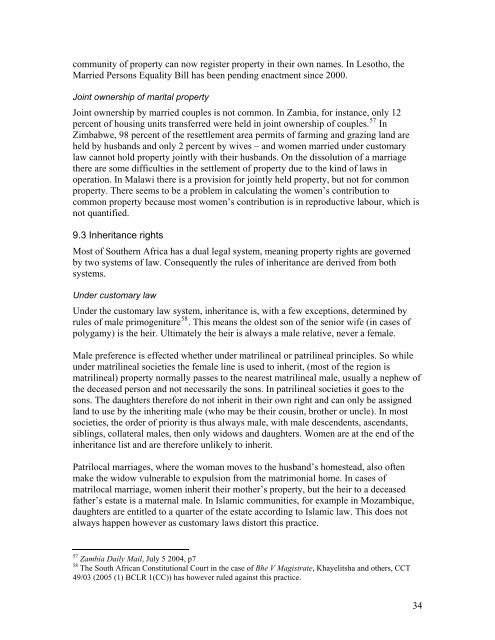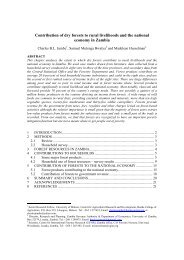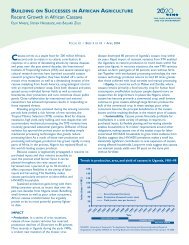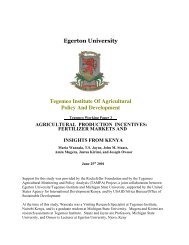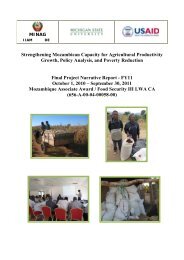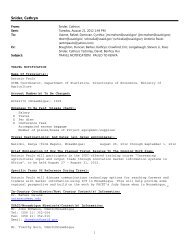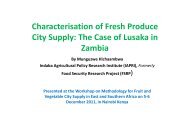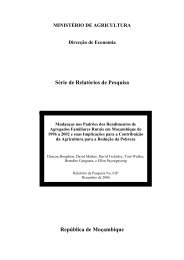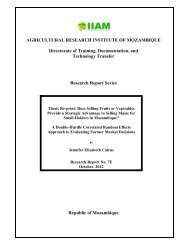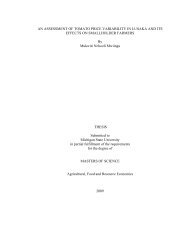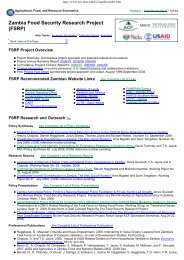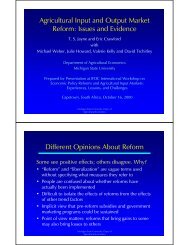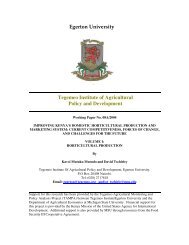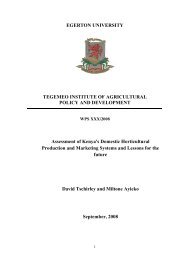community of property can now register property in their own names. In Lesotho, theMarried Persons Equality Bill has been pending enactment since 2000.Joint ownership of marital propertyJoint ownership by married couples is not common. In Zambia, for instance, only 12percent of housing units transferred were held in joint ownership of couples. 57 InZimbabwe, 98 percent of the resettlement area permits of farming <strong>and</strong> grazing l<strong>and</strong> areheld by husb<strong>and</strong>s <strong>and</strong> only 2 percent by wives – <strong>and</strong> women married under customarylaw cannot hold property jointly with their husb<strong>and</strong>s. On the dissolution of a marriagethere are some difficulties in the settlement of property due to the kind of laws inoperation. In Malawi there is a provision for jointly held property, but not for commonproperty. There seems to be a problem in calculating the women’s contribution tocommon property because most women’s contribution is in reproductive labour, which isnot quantified.9.3 Inheritance rightsMost of Southern Africa has a dual legal system, meaning property rights are governedby two systems of law. Consequently the rules of inheritance are derived from bothsystems.Under customary lawUnder the customary law system, inheritance is, with a few exceptions, determined byrules of male primogeniture 58 . This means the oldest son of the senior wife (in cases ofpolygamy) is the heir. Ultimately the heir is always a male relative, never a female.Male preference is effected whether under matrilineal or patrilineal principles. So whileunder matrilineal societies the female line is used to inherit, (most of the region ismatrilineal) property normally passes to the nearest matrilineal male, usually a nephew ofthe deceased person <strong>and</strong> not necessarily the sons. In patrilineal societies it goes to thesons. The daughters therefore do not inherit in their own right <strong>and</strong> can only be assignedl<strong>and</strong> to use by the inheriting male (who may be their cousin, brother or uncle). In mostsocieties, the order of priority is thus always male, with male descendents, ascendants,siblings, collateral males, then only widows <strong>and</strong> daughters. Women are at the end of theinheritance list <strong>and</strong> are therefore unlikely to inherit.Patrilocal marriages, where the woman moves to the husb<strong>and</strong>’s homestead, also oftenmake the widow vulnerable to expulsion from the matrimonial home. In cases ofmatrilocal marriage, women inherit their mother’s property, but the heir to a deceasedfather’s estate is a maternal male. In Islamic communities, for example in Mozambique,daughters are entitled to a quarter of the estate according to Islamic law. This does notalways happen however as customary laws distort this practice.57 Zambia Daily Mail, July 5 2004, p758 The South African Constitutional Court in the case of Bhe V Magistrate, Khayelitsha <strong>and</strong> others, CCT49/03 (2005 (1) BCLR 1(CC)) has however ruled against this practice.34
Widows’ inheritance rights are also subject to certain conditions. In some cases, they mayonly inherit if they comply with certain customary rituals. 59 Often, where customaryinheritance is controlled by an act, 60 patriarchal attitudes <strong>and</strong> male preference <strong>and</strong>dominance in property ownership <strong>and</strong> inheritance are a problem.Finally, in countries where the constitution still allows the application of customary lawin inheritance matters, such as Lesotho, Zambia <strong>and</strong> Zimbabwe, High Court decisionshave ensured the continuation of this practice in spite of the fact that it clearlydiscriminates against women. 61In general, women in Southern Africa have a very limited right to inherit; they often onlyhave a secondary right to use the property of the deceased husb<strong>and</strong> or father.Under statuteThe effect of the inheritance <strong>and</strong> succession statutes in the region is to vary the provisionsunder customary law.In Lesotho, the Draft White Paper on <strong>L<strong>and</strong></strong> does not support the radical abolition ofcustomary law, but the conversion of customary law rights to common law rights. 62Proposals have been made to the effect that decisions about who should get rights in l<strong>and</strong>including through inheritance would be determined by who would make the mostproactive use of the l<strong>and</strong>. Currently, one is obliged to show that they have moved awayfrom customary law to be able to bequeath property to daughters in a will. However, theLesotho <strong>L<strong>and</strong></strong> Act of 1997 allows widows to stay in the matrimonial home provided theydo not remarry, thereby giving the widow usufruct rights <strong>and</strong> not ownership rights.Therefore women do not inherit property but acquire a right to use the property.In Botswana <strong>and</strong> Namibia, inheritance under the statute is tied to the marriage regime forpeople married under Civil Law (i.e., in or out of community of property). TheAdministration of Estates Act 1979 in Botswana allows men to exclude their wives fromthe will if the marriage is out of community of property. In Zimbabwe, the key statutedealing with inheritance is the Administration of Estates Act (as amended by Act No. 6 of1997). The customary law heir, usually a male, now only receives traditional heirlooms(the name <strong>and</strong> traditional knobkerrie) <strong>and</strong> ownership of the matrimonial home devolvesto the surviving spouse. The rest of the estate is shared in equal portions between thesurviving spouse <strong>and</strong> the children of the deceased. The Deceased Persons Family59 Women <strong>and</strong> Law in Southern Africa Research <strong>and</strong> Educational Trust-Swazil<strong>and</strong>, Inheritance inSwazil<strong>and</strong>: Law <strong>and</strong> Practice, 1994, 56-57. In Swazil<strong>and</strong>, these rituals are traditional mourning rites,(kuzila) <strong>and</strong> kungenwa (levirate or widow inheritance).60 For instance Namibia’s Communal <strong>L<strong>and</strong></strong> Reform Act 2002 read with Art. 66 of the constitution61 See the Women <strong>and</strong> Law in Southern Africa Research <strong>and</strong> Educational Trust-Zimbabwe. (2001). VeniaMagaya’s Sacrifice: A case of Custom Gone Awry. Venia Magaya Case 1998 SC 210; 1999 1 ZLR 100(Zimbabwe); Chilala Vs. Milimo LAT 09/99 (Zambia); <strong>and</strong> Tsosane <strong>and</strong> Tsosane, 1971-73 Lesotho LawReports 1 (Lesotho).62 Walker, C. (2003). <strong>L<strong>and</strong></strong> Reform in Southern <strong>and</strong> Eastern Africa: Key Issues for Strengthening Women’sAccess to <strong>and</strong> <strong>Rights</strong> in <strong>L<strong>and</strong></strong>. Report to FAO. See also www.oxfam.org.uk35
- Page 3: FOREWORD TO SOUTHERN AFRICA LAW AND
- Page 8 and 9: housing for poor people. Finally, l
- Page 10 and 11: Law and Land Tenure ReviewSOUTHERN
- Page 12: Figure 1.1 Map of Southern Africa
- Page 15 and 16: Table 1.1 Social development indica
- Page 17 and 18: Thirdly, the superficies solo cedit
- Page 19 and 20: e dominated by rural land reform, e
- Page 21 and 22: Table 4.2 Patterns of land distribu
- Page 23 and 24: Women’s movementsMany women’s c
- Page 25 and 26: Women are also often excluded in la
- Page 27 and 28: oth cases is to provide an adequate
- Page 29 and 30: 9 Women’s rights to land and hous
- Page 31 and 32: Some key points:Apart from Malawi,
- Page 33: summed up in the Zimbabwe High Cour
- Page 37 and 38: Table 9.2 HIV/AIDS infection rates
- Page 39 and 40: 10 Racial and ethnic equalityIn cou
- Page 41 and 42: is focused on empowering Southern A
- Page 43 and 44: The next section, on land tenure, i
- Page 45 and 46: Investment Act 385 21Land (Perpetua
- Page 48 and 49: 1 Introduction and Background1.1 Hi
- Page 50 and 51: as elimination of subsidies and pri
- Page 52 and 53: eligible to vote. The current parli
- Page 54 and 55: Table 1.1 Jurisdiction of various c
- Page 56 and 57: A District Commissioner (DC) is res
- Page 58 and 59: Committees will be involved in all
- Page 60 and 61: percentage comprises those rented f
- Page 62 and 63: National Legal Aid Clinic for Women
- Page 64 and 65: especially surviving parents -and t
- Page 66 and 67: circumstances weaken the rights of
- Page 68 and 69: 2.3 Customary lawIn the context of
- Page 70 and 71: Finally, the fees for these plots a
- Page 72 and 73: Under this policy, as mentioned ear
- Page 74 and 75: Type Characteristics Legal basisUnr
- Page 76 and 77: information on “the area and dime
- Page 78 and 79: system that was put in place at the
- Page 80 and 81: stages, the UNIP government initiat
- Page 82 and 83: Both of these provisions commit the
- Page 84 and 85:
Upgrading of unplanned settlements
- Page 86 and 87:
divorce, i.e. irretrievable breakdo
- Page 88 and 89:
(1) In a case where a person has di
- Page 90 and 91:
Apart from the stipulations in the
- Page 92 and 93:
English amended Matrimonial Causes
- Page 94 and 95:
others, uncles, husbands or sons. 2
- Page 96 and 97:
funeral expenses and estate duty if
- Page 98 and 99:
question of shelter is crucial for
- Page 100 and 101:
Figure 6.2 Institutional framework
- Page 102 and 103:
In Lusaka, the city council in conj
- Page 104 and 105:
the council, they are allowed to be
- Page 106 and 107:
6.3 Dispute settlement mechanismsTh
- Page 108 and 109:
Banda, as widow of the late legal t
- Page 110 and 111:
a long way to go before supply adeq
- Page 112 and 113:
the incidents enumerated have been
- Page 114 and 115:
indicates that in the year 2000 it
- Page 116 and 117:
which these rights are premised. Th
- Page 118 and 119:
The right to adequate housing, whic
- Page 120 and 121:
undertaken to harmonise the two sys
- Page 122 and 123:
ReferencesAugustinus, C. and Bensch
- Page 124 and 125:
Mvunga, M.P. (1980). Land Law and P
- Page 126 and 127:
List of persons and organisations i
- Page 128 and 129:
Keller, B. Phiri, E. & Milimo, M. (
- Page 130 and 131:
Appendix I: International human rig
- Page 132 and 133:
The Convention on the Elimination o
- Page 134 and 135:
: 2000Optional Protocol toICCPR of


